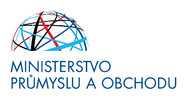Scott MacDonald
Profese: pedagog
Země: USA
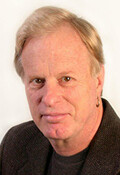
Zdroj: Hamilton.edu
Publikace autora
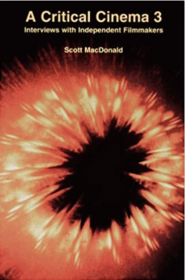
A critical cinema
Scott MacDonald
1988 / 3 stran
A Critical Cinema 3 continues Scott MacDonald's compilation of personal interviews and public discussions with major contributors to independent filmmaking and film awareness. An informative exchange with Amos Vogel, whose Cinema 16 Society drew American filmgoers into a broader sense of film history, is followed by interviews reflecting a wide range of approaches to filmmaking. Sally Potter discusses her popular feature, Orlando, in relation to the experimental work that preceded it, and Canadian independent John Porter argues compellingly for small-gauge, Super-8mm filmmaking. Ken Jacobs discusses the "Nervous System" apparatus with which he transforms old film footage into new forms of motion picture art; Jordan Belson describes his Vortex Concerts, ancestors of modern laser light shows; and Elias Merhige talks about going beneath the "rational structure of meaning" in Begotten. A Critical Cinema 3 presents independent cinema as an international and multiethnic phenomenon. MacDonald interviews filmmakers from Sweden, France, Italy, Austria, Armenia, India, the Philippines, and Japan and examines the work of African Americans, European Americans, Asian Americans, and Hispanics. He provides an introductory overview of each interviewee, as well as detailed film/videographies and selected bibliographies. With its predecessors, A Critical Cinema (California, 1988) and A Critical Cinema 2 (California, 1992), this is the most extensive, in-depth exploration of independent cinema available in English. [amazon.co.uk]
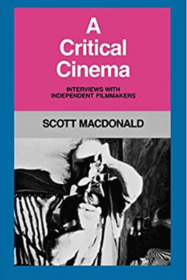
A critical cinema
Scott MacDonald
It is widely understood that writing can discuss writing, but we rarely consider that film can be used as a means of analyzing conventions of the commercial film industry, or of theorizing about cinema in general. Over the past few decades, however, independent cinema has produced a body of fascinating films that provide intensive critiques of nearly every element of the cinematic apparatus. The experience of these films simultaneously depends on and redefines our relationship to the movies. Critical Cinema provides a collection of in-depth interviews with some of the most accomplished "critical" filmmakers. These interviews demonstrate the sophistication of their thinking about film (and a wide range of other concerns) and serve as an accessible introduction to this important area of independent cinema. Each interview is preceded by a general introduction to the filmmaker's work; detailed filmographies and bibliographies are included. Critical Cinema will be a valuable resource for all those involved in the formal study of film, and will be essential reading for film lovers interested in keeping abreast of recent developments in North American cinema.
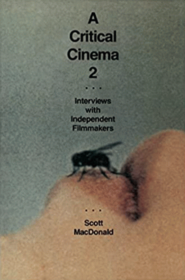
A critical cinema 2
Scott MacDonald
This sequel to A Critical Cinema offers a new collection of interviews with independent filmmakers that is a feast for film fans and film historians. Scott MacDonald reveals the sophisticated thinking of these artists regarding film, politics, and contemporary gender issues. The interviews explore the careers of Robert Breer, Trinh T. Minh-ha, James Benning, Su Friedrich, and Godfrey Reggio. Yoko Ono discusses her cinematic collaboration with John Lennon, Michael Snow talks about his music and films, Anne Robertson describes her cinematic diaries, Jonas Mekas and Bruce Baillie recall the New York and California avant-garde film culture. The selection has a particularly strong group of women filmmakers, including Yvonne Rainer, Laura Mulvey, and Lizzie Borden. Other notable artists are Anthony McCall, Andrew Noren, Ross McElwee, Anne Severson, and Peter Watkins.
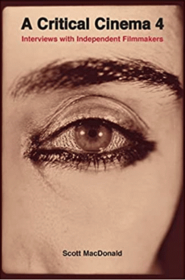
A critical cinema 4
Scott MacDonald
A Critical Cinema 4 is the fourth volume in Scott MacDonald's Critical Cinema series, the most extensive, in-depth exploration of independent cinema available in English. In this new set of interviews, MacDonald once again engages filmmakers in detailed discussions of their films and of the personal experiences and political and theoretical currents that have shaped their work. The interviews are arranged to express the remarkable diversity of modern independent cinema and the network of interconnections within the community of filmmakers. A Critical Cinema 4 includes the most extensive interview with the late Stan Brakhage yet published; a conversation with P. Adams Sitney about his arrival on the New York independent film scene; a detailed discussion with Peter Kubelka about the experience of making Our African Journey; a conversation with Jill Godmilow and Harun Farocki on modern political documentary; Jim McBride's first extended published conversation in thirty years; a discussion with Abigail Child about her evolution from television documentarian to master editor; and the first extended interview with Chuck Workman. This volume also contains discussions with Chantal Akerman about her place trilogy; Lawrence Brose on his examination of Oscar Wilde's career; Hungarian Peter Forgács about his transformation of European home movies into video operas; Iranian-born Shirin Neshat on working between two cultures; and Ellen Spiro about exploring America with her video camera and her dog. Each interview is supplemented by an introductory overview of the filmmaker's contributions. A detailed filmography and a selected bibliography complete the volume.
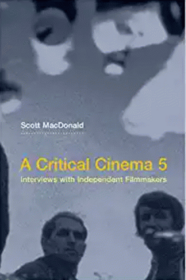
A critical cinema 5
Scott MacDonald
2006 / 1 stran
A Critical Cinema 5 is the fifth volume in Scott MacDonald's Critical Cinema series, the most extensive, in-depth exploration of independent cinema available in English. In this new set of interviews, MacDonald engages filmmakers in detailed discussions of their films and of the personal experiences and political and theoretical currents that have shaped their work. The interviews are arranged to express the remarkable diversity of modern independent cinema and the interactive community of filmmakers that has dedicated itself to producing forms of cinema that critique conventional media. [amazon.com]
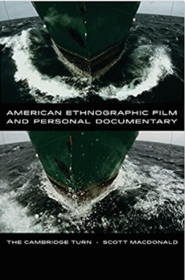
American ethnographic film and personal documentary
Scott MacDonald
2013 / 1 stran
American Ethnographic Film and Personal Documentary is a critical history of American filmmakers crucial to the development of ethnographic film and personal documentary. The Boston and Cambridge area is notable for nurturing these approaches to documentary film via institutions such as the MIT Film Section and the Film Study Center, the Carpenter Center and the Visual and Environmental Studies Department at Harvard. Scott MacDonald uses pragmatism’s focus on empirical experience as a basis for measuring the groundbreaking achievements of such influential filmmakers as John Marshall, Robert Gardner, Timothy Asch, Ed Pincus, Miriam Weinstein, Alfred Guzzetti, Ross McElwee, Robb Moss, Nina Davenport, Steve Ascher and Jeanne Jordan, Michel Negroponte, John Gianvito, Alexander Olch, Amie Siegel, Ilisa Barbash, and Lucien Castaing-Taylor. By exploring the cinematic, personal, and professional relationships between these accomplished filmmakers, MacDonald shows how a pioneering, engaged, and uniquely cosmopolitan approach to documentary developed over the past half century. [amazon.com]
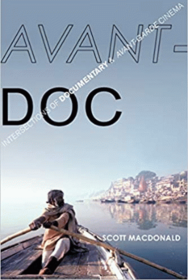
Avant-doc
Scott MacDonald
MacDonald explores the cinematic territory between the traditional categories of "documentary" and "avant-garde" film, through candid, in-depth conversations with filmmakers whose work has challenged these categories. Arranged in an imaginative chronology and written to be accessible to any film-interested reader, the interviews in Avant-Doc chart half a century of thinking by inventive filmmakers such as Robert Gardner, Ed Pincus, Alfred Guzzetti, Ross McElwee, Leonard Retel Helmrich, Michael Glawogger, Susana de Sousa Dias, Jonathan Caouette, Pawel Wojtasik, and Todd Haynes. Recent breakthroughs by Amie Siegel, Jane Gillooly, Jennifer Proctor, Betzy Bromberg, and Godfrey Reggio are discussed; and considerable attention is paid to Harvard's innovative Sensory Ethnography Lab, producer of Sweetgrass, Leviathan, and Manakamana. A rare interview with pioneering scholar Annette Michelson begins Avant-Doc's meta-conversation. [amazon.com]
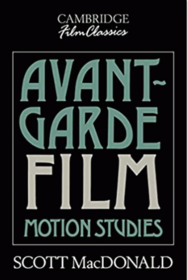
Avant-garde film
Scott MacDonald
1993
The past thirty years have seen the proliferation of forms of independent cinema that challenge the conventions of mass-market commercial movies from within the movie theatre. Avant-Garde Film examines fifteen of the most suggestive and useful films from this film tradition. The films discussed include No. 4 (Bottoms) by Yoko Ono, Wavelength by Michael Snow, Serene Velocity by Ernie Gehr, Print Generation by J. J. Murphy, Standard Gauge by Morgan Fisher, Zorns Lemma by Hollis Frampton, The Ties that Bind by Su Friedrich, From the Pole to the Equator by Yervant Gianikian and The Carriage Trade by Warren Sonbert. Through in-depth readings of these works, Scott MacDonald takes viewers on a critical circumnavigation of the conventions of movie going as seen by filmmakers who have rebelled against the conventions. MacDonald's discussions do not merely analyse the films; they provide a useful, accessible, jargon-free critical apparatus for viewing avant-garde film and communicate the author's pleasure in exploring 'impenetrable' works. [amazon.com]






